外研版(2019)必修第三册Unit 2 Making a difference Understanding ideas & Using language课件(共25张PPT)
文档属性
| 名称 | 外研版(2019)必修第三册Unit 2 Making a difference Understanding ideas & Using language课件(共25张PPT) | 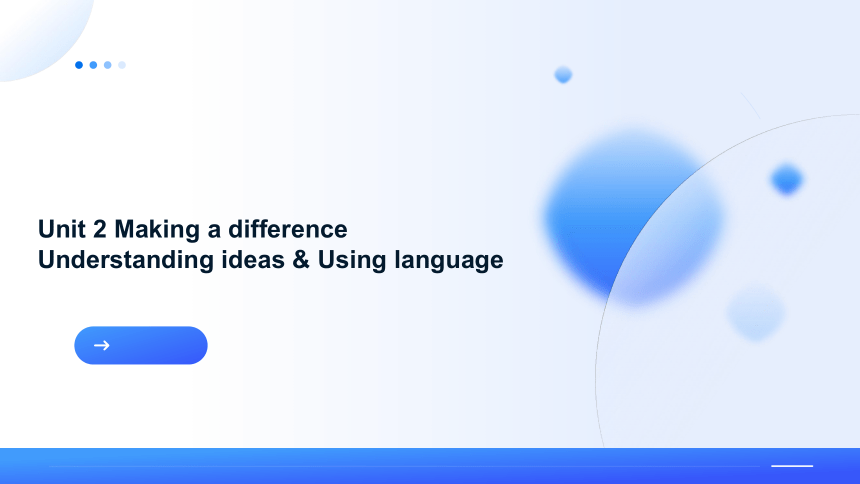 | |
| 格式 | pptx | ||
| 文件大小 | 4.5MB | ||
| 资源类型 | 教案 | ||
| 版本资源 | 外研版(2019) | ||
| 科目 | 英语 | ||
| 更新时间 | 2024-06-12 16:02:28 | ||
图片预览

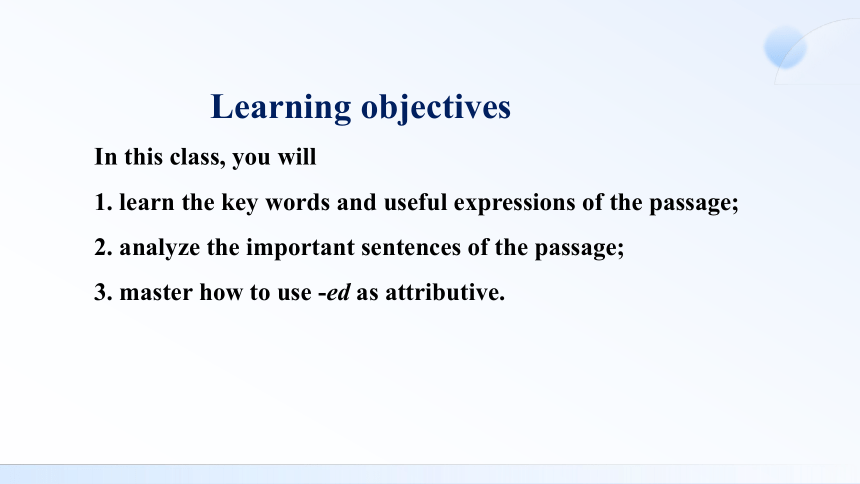
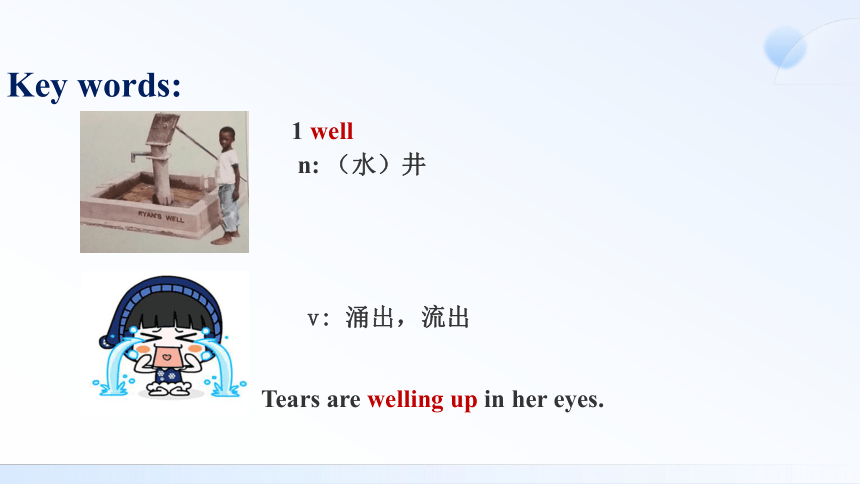
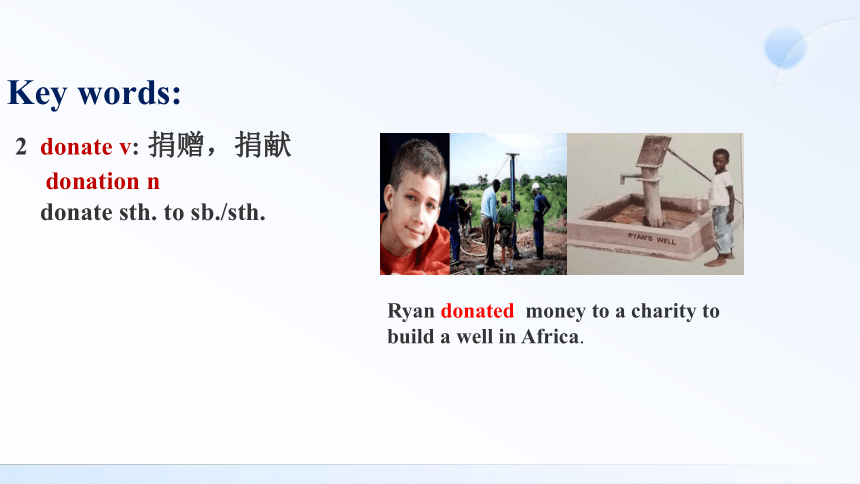
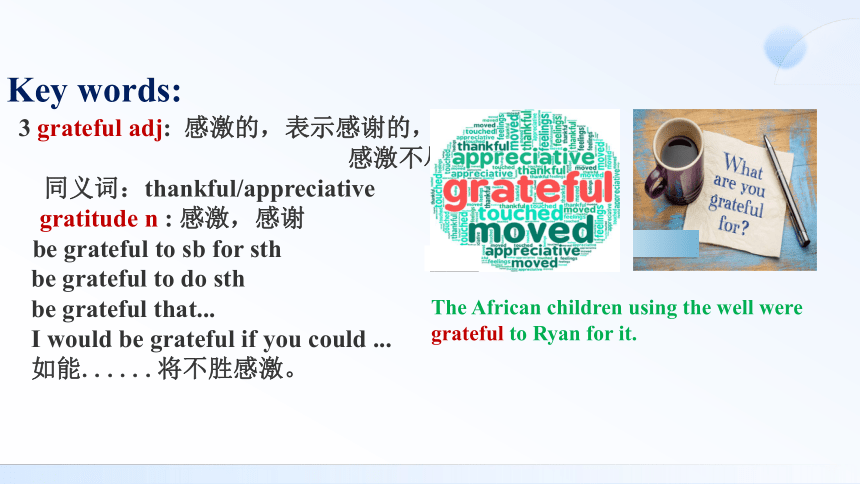
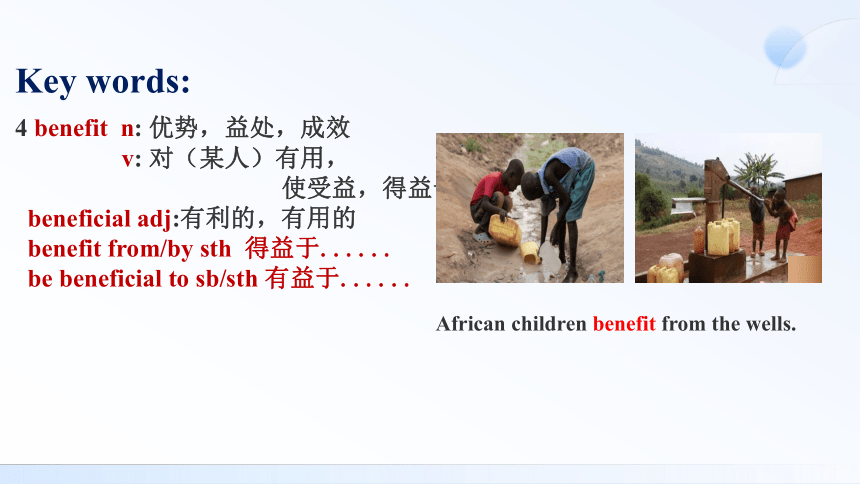
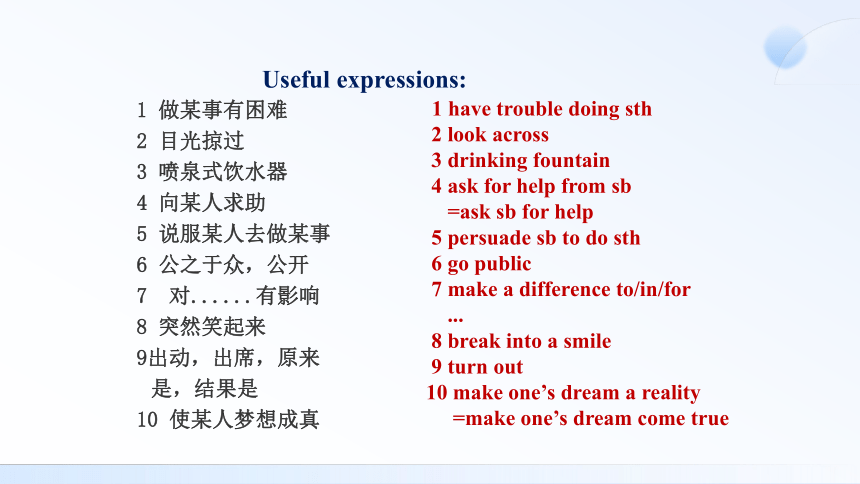
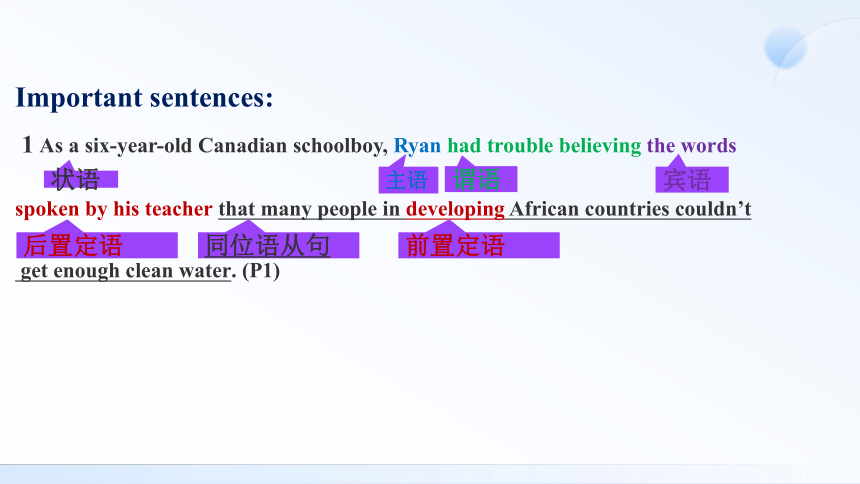

文档简介
(共25张PPT)
Unit 2 Making a difference
Understanding ideas & Using language
Learning objectives
In this class, you will
1. learn the key words and useful expressions of the passage;
2. analyze the important sentences of the passage;
3. master how to use -ed as attributive.
Key words:
1 well
n: (水)井
Tears are welling up in her eyes.
v: 涌出,流出
Key words:
2 donate v: 捐赠,捐献
donation n
donate sth. to sb./sth.
Ryan donated money to a charity to
build a well in Africa.
Key words:
3 grateful adj: 感激的,表示感谢的,
感激不尽,请
同义词:thankful/appreciative
gratitude n : 感激,感谢
be grateful to sb for sth
be grateful to do sth
be grateful that...
I would be grateful if you could ...
如能......将不胜感激。
The African children using the well were grateful to Ryan for it.
Key words:
4 benefit n: 优势,益处,成效
v: 对(某人)有用,
使受益,得益于
beneficial adj:有利的,有用的
benefit from/by sth 得益于......
be beneficial to sb/sth 有益于......
African children benefit from the wells.
Useful expressions:
1 做某事有困难
2 目光掠过
3 喷泉式饮水器
4 向某人求助
5 说服某人去做某事
6 公之于众,公开
7 对......有影响
8 突然笑起来
9出动,出席,原来是,结果是
10 使某人梦想成真
1 have trouble doing sth
2 look across
3 drinking fountain
4 ask for help from sb
=ask sb for help
5 persuade sb to do sth
6 go public
7 make a difference to/in/for
...
8 break into a smile
9 turn out
10 make one’s dream a reality
=make one’s dream come true
Important sentences:
1 As a six-year-old Canadian schoolboy, Ryan had trouble believing the words
spoken by his teacher that many people in developing African countries couldn’t
get enough clean water. (P1)
状语
主语
宾语
谓语
后置定语
同位语从句
前置定语
Important sentences:
2 Two thousand dollars was a lot of money, ...(P3)
e.g.
A hundred miles is a long distance.
Twenty years stands for a long period in one's life.
主语
系动词
表语
Important sentences:
3 After several months, Ryan had raised the $2,000, with which a
well was built near a primary school in Uganda.(P3)
状语
主语
谓语
宾语
定语从句
Using language: -ed as attributive
Look at the sentences from the reading passage and answer the questions.
a ...Ryan had trouble believing the words spoken by his teacher...
b In Uganda, Ryan at last saw the finished well with his own eyes.
Questions
1 What was spoken in sentence (a) What was finished in sentence(b)?
2 Why does the author use -ed instead of -ing?
Using language: -ed as attributive
Compare them with the following sentences and answer the questions.
3 What is the difference between the two groups of sentences
4 Why does the author choose to use -ed instead of an attributive clause in the reading passage
c …Ryan had trouble believing the words which were spoken by his teacher…
d In Uganda, Ryan at last saw the well, which was finished, with his own eyes.
Using language: -ed as attributive
Now look for more sentences with -ed as attributive in the reading passage.
1) What they needed was a well dug near their homes.
2) Many inspired people gave him their support.
3) He also saw hundreds of delighted students who had turned out to welcome
him.
4) This insight grew from the determined attitude of a six-year-old boy who
had…
Using language: -ed as attributive
fallen leaves
=leaves which have fallen
destroyed houses
=houses which have been destroyed
Using language: -ed as attributive
an excited boy=a boy who is excited
Using language: -ed as attributive
the rising sun
=the sun which is rising
the risen sun
=the sun which has risen
Using language: -ed as attributive
v.-ing can be used to tell the use of the modified noun.
e.g. a washing machine a walking stick
a swimming pool a reading room
a drinking fountain
Using language: -ed as attributive
Read the discussion between two students about Ryan’s foundation. Rewrite the underlined sentences using the -ed form.
Ryan is a young man who is admired by a lot of people. The money which is raised by his foundation supports schools and communities in Africa. I think digging wells for drinking water is…
... to solve the problem of water shortage in Africa. As in the words which were spoken by Ryan, we need to not only donate money but also get new ideas. I think the support which is needed includes new technology for recycling water and education on how to use and save water.
Activity 2
Using language: -ed as attributive
Some tips:
1.Ryan is a young man who is admired by a lot of people.
find out the attributive clause
Ryan is a young man admired by a lot of people.
replace the attributive clause with -ed form
Activity 2
Using language: -ed as attributive
Have a try!
2. The money which is raised by his foundation supports schools and communities in Africa.
The money raised by his foundation supports schools and communities in Africa.
Activity 2
Using language: -ed as attributive
Have a try!
3. As in the words which were spoken by Ryan, we need to not only donate money but also get new ideas.
As in the words spoken by Ryan, we need to not only donate money but also get new ideas.
Activity 2
Using language: -ed as attributive
Have a try!
4. I think the support which is needed includes new technology for recycling water and education on how to use and save water.
I think the support needed includes new technology for recycling water and education on how to use and save water.
Activity 2
Using language: -ed as attributive
Read the passage and choose the correct form of the words.
The United Nations Children’s Fund, also knowing / known as UNICEF, is a United Nations (UN) organization basing / based in New York. It offers help needing / needed by children all over the world.
Activity 3
Using language: -ed as attributive
Read the passage and choose the correct form of the words.
UNICEF was founded on 11 December 1946, to provide food and healthcare to children in countries damaging /damaged in World War II. Since 1953, UNICEF has taken up an extended mission to help children in the developing / developed world, including those living / lived with diseases or disabilities, and those affecting / affected by rapid modernisation and
environmental problems...
Activity 3
Homework:
1. Remember the key words and useful expressions.
2. Review the usage of -ed as attributive.
3. Finish the related exercises.
Unit 2 Making a difference
Understanding ideas & Using language
Learning objectives
In this class, you will
1. learn the key words and useful expressions of the passage;
2. analyze the important sentences of the passage;
3. master how to use -ed as attributive.
Key words:
1 well
n: (水)井
Tears are welling up in her eyes.
v: 涌出,流出
Key words:
2 donate v: 捐赠,捐献
donation n
donate sth. to sb./sth.
Ryan donated money to a charity to
build a well in Africa.
Key words:
3 grateful adj: 感激的,表示感谢的,
感激不尽,请
同义词:thankful/appreciative
gratitude n : 感激,感谢
be grateful to sb for sth
be grateful to do sth
be grateful that...
I would be grateful if you could ...
如能......将不胜感激。
The African children using the well were grateful to Ryan for it.
Key words:
4 benefit n: 优势,益处,成效
v: 对(某人)有用,
使受益,得益于
beneficial adj:有利的,有用的
benefit from/by sth 得益于......
be beneficial to sb/sth 有益于......
African children benefit from the wells.
Useful expressions:
1 做某事有困难
2 目光掠过
3 喷泉式饮水器
4 向某人求助
5 说服某人去做某事
6 公之于众,公开
7 对......有影响
8 突然笑起来
9出动,出席,原来是,结果是
10 使某人梦想成真
1 have trouble doing sth
2 look across
3 drinking fountain
4 ask for help from sb
=ask sb for help
5 persuade sb to do sth
6 go public
7 make a difference to/in/for
...
8 break into a smile
9 turn out
10 make one’s dream a reality
=make one’s dream come true
Important sentences:
1 As a six-year-old Canadian schoolboy, Ryan had trouble believing the words
spoken by his teacher that many people in developing African countries couldn’t
get enough clean water. (P1)
状语
主语
宾语
谓语
后置定语
同位语从句
前置定语
Important sentences:
2 Two thousand dollars was a lot of money, ...(P3)
e.g.
A hundred miles is a long distance.
Twenty years stands for a long period in one's life.
主语
系动词
表语
Important sentences:
3 After several months, Ryan had raised the $2,000, with which a
well was built near a primary school in Uganda.(P3)
状语
主语
谓语
宾语
定语从句
Using language: -ed as attributive
Look at the sentences from the reading passage and answer the questions.
a ...Ryan had trouble believing the words spoken by his teacher...
b In Uganda, Ryan at last saw the finished well with his own eyes.
Questions
1 What was spoken in sentence (a) What was finished in sentence(b)?
2 Why does the author use -ed instead of -ing?
Using language: -ed as attributive
Compare them with the following sentences and answer the questions.
3 What is the difference between the two groups of sentences
4 Why does the author choose to use -ed instead of an attributive clause in the reading passage
c …Ryan had trouble believing the words which were spoken by his teacher…
d In Uganda, Ryan at last saw the well, which was finished, with his own eyes.
Using language: -ed as attributive
Now look for more sentences with -ed as attributive in the reading passage.
1) What they needed was a well dug near their homes.
2) Many inspired people gave him their support.
3) He also saw hundreds of delighted students who had turned out to welcome
him.
4) This insight grew from the determined attitude of a six-year-old boy who
had…
Using language: -ed as attributive
fallen leaves
=leaves which have fallen
destroyed houses
=houses which have been destroyed
Using language: -ed as attributive
an excited boy=a boy who is excited
Using language: -ed as attributive
the rising sun
=the sun which is rising
the risen sun
=the sun which has risen
Using language: -ed as attributive
v.-ing can be used to tell the use of the modified noun.
e.g. a washing machine a walking stick
a swimming pool a reading room
a drinking fountain
Using language: -ed as attributive
Read the discussion between two students about Ryan’s foundation. Rewrite the underlined sentences using the -ed form.
Ryan is a young man who is admired by a lot of people. The money which is raised by his foundation supports schools and communities in Africa. I think digging wells for drinking water is…
... to solve the problem of water shortage in Africa. As in the words which were spoken by Ryan, we need to not only donate money but also get new ideas. I think the support which is needed includes new technology for recycling water and education on how to use and save water.
Activity 2
Using language: -ed as attributive
Some tips:
1.Ryan is a young man who is admired by a lot of people.
find out the attributive clause
Ryan is a young man admired by a lot of people.
replace the attributive clause with -ed form
Activity 2
Using language: -ed as attributive
Have a try!
2. The money which is raised by his foundation supports schools and communities in Africa.
The money raised by his foundation supports schools and communities in Africa.
Activity 2
Using language: -ed as attributive
Have a try!
3. As in the words which were spoken by Ryan, we need to not only donate money but also get new ideas.
As in the words spoken by Ryan, we need to not only donate money but also get new ideas.
Activity 2
Using language: -ed as attributive
Have a try!
4. I think the support which is needed includes new technology for recycling water and education on how to use and save water.
I think the support needed includes new technology for recycling water and education on how to use and save water.
Activity 2
Using language: -ed as attributive
Read the passage and choose the correct form of the words.
The United Nations Children’s Fund, also knowing / known as UNICEF, is a United Nations (UN) organization basing / based in New York. It offers help needing / needed by children all over the world.
Activity 3
Using language: -ed as attributive
Read the passage and choose the correct form of the words.
UNICEF was founded on 11 December 1946, to provide food and healthcare to children in countries damaging /damaged in World War II. Since 1953, UNICEF has taken up an extended mission to help children in the developing / developed world, including those living / lived with diseases or disabilities, and those affecting / affected by rapid modernisation and
environmental problems...
Activity 3
Homework:
1. Remember the key words and useful expressions.
2. Review the usage of -ed as attributive.
3. Finish the related exercises.
